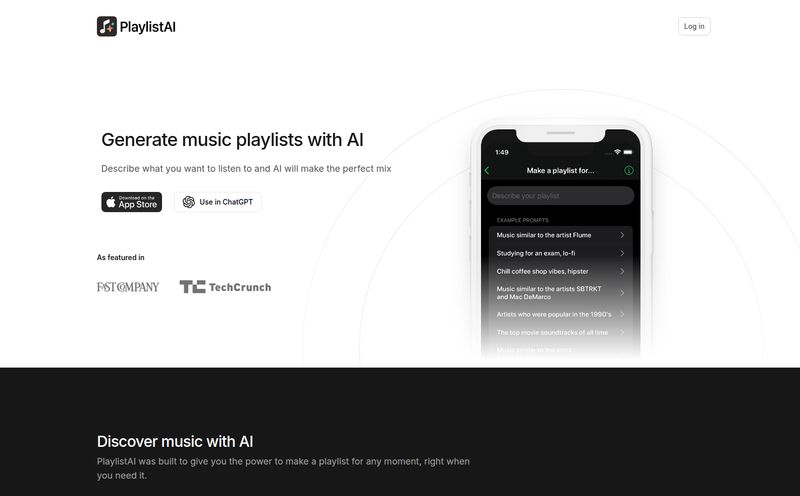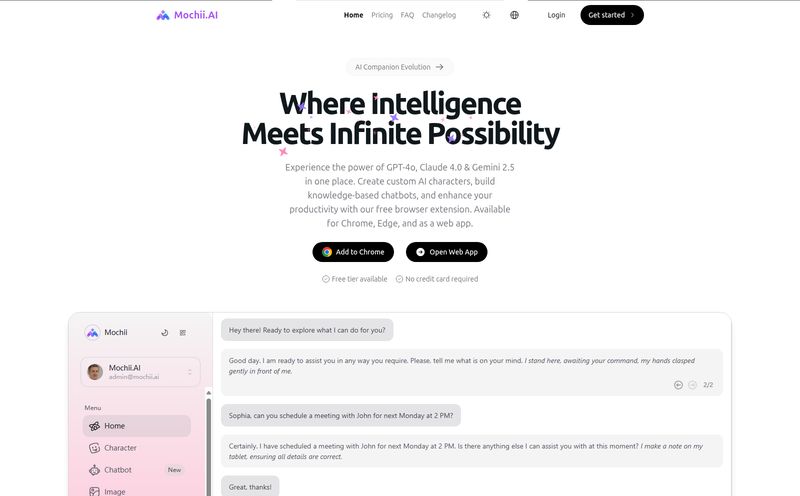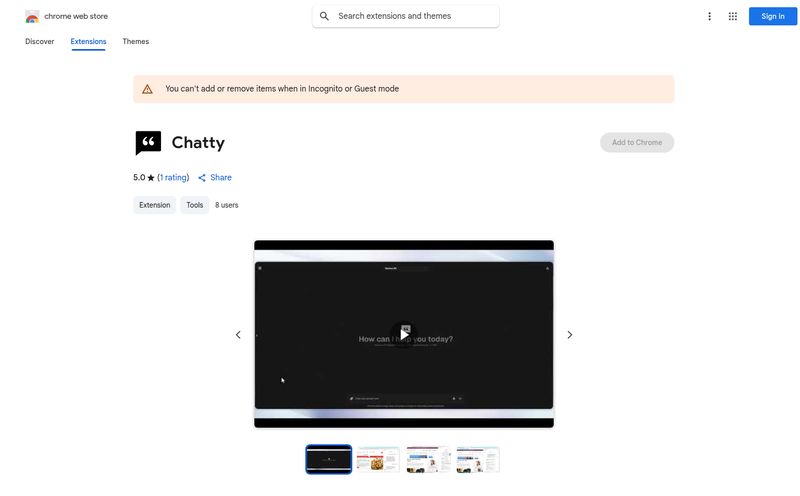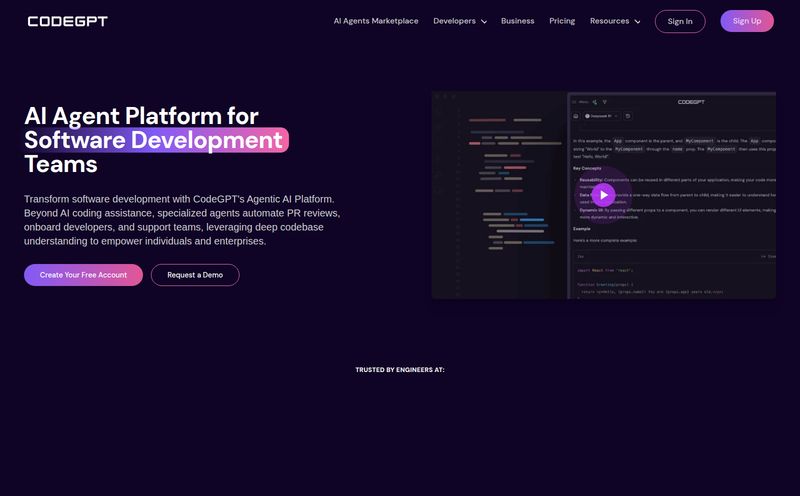Pull requests can be a drag. You pour your heart and soul into a new feature, push it up, and then… you wait. And wait. You’re at the mercy of your team’s busiest developer, who has to find a spare 45 minutes to comb through your logic, check for style guide violations, and maybe, just maybe, spot that one sneaky off-by-one error.
We’ve all been there. The endless back-and-forth. The nitpicky comments about whitespace. The sinking feeling when a major architectural flaw is spotted hours before a release. It’s a process that's vital for quality, but man, it can feel like pouring molasses in January. For years, the dream has been to automate the tedious parts, to have a second set of eyes that’s always on, always sharp, and never gets tired or grumpy after lunch.
Enter the AI assistants. They’re everywhere now, writing our emails, generating our images, and now, they’re coming for our code. I’ve been watching this space for a while, and a new tool called GitChat by Locale.ai recently popped up on my radar. Its promise? To make code reviews faster and better. My first thought: “Yeah, sure.” My second thought: “Okay, but what if it actually works?”
So, What Exactly is GitChat?
Think of GitChat less as a robot overlord and more as a really smart co-pilot for your GitHub workflow. It’s an AI-powered tool that plugs into your pull request process. It doesn't replace your senior dev, Brenda, who can spot a race condition from a mile away. Instead, it aims to be her tireless assistant. It handles the first pass, summarizing changes and flagging obvious issues, so Brenda can focus her brainpower on the stuff that really matters.
The whole thing is built around the idea of augmenting human developers, not replacing them. It’s like giving your whole team a junior dev who’s read every single line of code ever written and is available 24/7. A pretty appealing thought, right?
The Core Features That Caught My Eye
I’ve seen a lot of AI tools that are all sizzle and no steak. They demo well but fall apart in a real-world production environment. So I took a closer look at what GitChat actually does. It boils down to a few key things.
AI-Powered Pull Request Summaries: Your TL;DR for Code
This is the first feature that makes you go, “Oh, that’s smart.” When a new PR comes in, GitChat automatically generates a summary of the changes. What features were added? What improvements were made? It’s all laid out in plain English. For a team lead or a project manager who needs a high-level overview without getting into the weeds of every single line, this is fantastic. It saves that initial “Okay, what am I even looking at?” moment, which can sometimes be half the battle.
Chatting with an AI About Your Code
Here’s where it gets a little bit sci-fi. GitChat lets you have a conversation with an AI about your code right there in the pull request comments. You can ask it questions like, “Are there any potential security vulnerabilities here?” or “Could this logic be simplified?” This is a huge step up from static analysis tools that just dump a list of errors on you. It’s interactive. It allows for a kind of Socratic dialogue with your own work, helping you uncover blind spots you might have missed. I'm genuinely curious to see how deep these conversations can go.
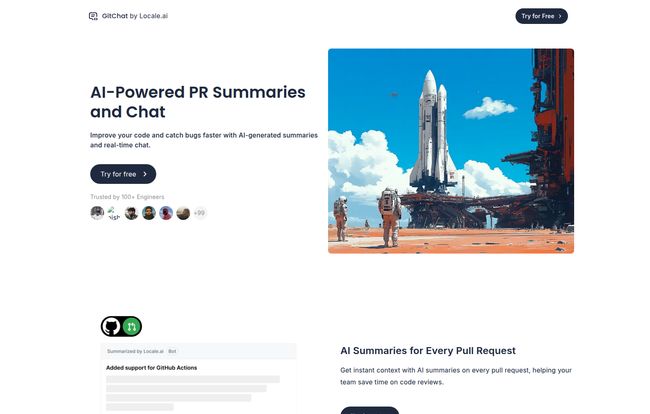
Visit GitChat by Locale.ai
A Customizable Code Review Assistant? Yes, Please.
Every team has its quirks. Its own unique coding standards, its specific architectural patterns, its unwritten rules. A one-size-fits-all linter just doesn’t cut it. GitChat seems to get this, offering a customizable assistant where you can set up your own rules and filters. You can teach it to watch for specific anti-patterns common to your codebase or to enforce your team's unique style guide. This level of control is what separates a gimmick from a genuinely useful engineering tool.
The Good, The Bad, and The AI-Generated
No tool is perfect, especially one venturing into the complex world of code analysis. So, let’s get real about the potential upsides and where we might hit some bumps.
On the plus side, the time savings are obvious. Automating the initial review pass and providing instant summaries frees up serious developer hours. This means faster feedback loops, which in turn means shipping products quicker and with more confidence. The ability to catch bugs earlier in the cycle is also a massive win. A bug caught in a PR is a minor annoyance; a bug caught in production is a five-alarm fire. I'd much rather have the AI annoy me.
But let's be realistic. There are some hurdles. First, there's the setup. It’s not just a magic button you press. You'll likely need to do some initial configuration to tune it to your team's needs. Second, and this is the big one, its effectiveness is entirely dependent on the quality of the underlying AI models. An AI that gives bad advice or misses critical bugs is worse than no AI at all. It creates a false sense of security. And finally, its world seems to revolve around GitHub pull requests. If your team uses GitLab or another platform, you might be out of luck for now.
"My main concern is always over-reliance. A tool like this is fantastic as a safety net and a productivity booster, but junior devs still need to learn why something is a bug, not just click a button to fix it."
So, How Much Does This Magic Cost?
This is the part of the review where I’d normally break down the pricing tiers. But here’s a funny story. I went looking for the pricing page on their website, clicked the link and… I got a 404 page. Yup, “This page could not be found.”
Honestly? I love it. It's so perfectly meta for a developer tool company. My guess is they’re either still finalizing the pricing, or more likely, GitChat is currently in a free beta or early access phase. This is common for new tools trying to get traction and feedback. So, for now, the price seems to be “free, if you’re willing to be an early adopter.” And for a chance to potentially revolutionize your PR process, that’s a pretty compelling offer.
Who is GitChat Really For?
I can see a few groups getting a lot out of this:
- Fast-Moving Startups: Teams where speed is everything and every developer is stretched thin. Automating parts of the review process could be a massive force multiplier.
- Large, Distributed Teams: When your reviewers are in different time zones, waiting for feedback can kill momentum. Instant AI feedback keeps the ball rolling.
- Teams with Junior Devs: It can act as a patient mentor, catching common mistakes and offering suggestions, which helps new developers learn the ropes without draining senior dev time.
It's probably less critical for a solo developer or a very small, tightly-knit team that already has a super-efficient review culture. But for most of us somewhere in the middle, it looks very promising.
Frequently Asked Questions about GitChat
Will GitChat replace our human code reviewers?
Absolutely not. That’s not the point. Think of it as an assistant that handles the tedious first-pass checks, so your human experts can focus on complex logic, architecture, and the bigger picture. It augments, it doesn't replace.
What platform does GitChat work with?
Based on all the language about “Pull Requests” and its name, it’s clearly designed to integrate with GitHub. There's no mention of support for other platforms like GitLab or Bitbucket at the moment.
Is GitChat difficult to set up?
It’s not a one-click install. There will be some initial setup and configuration involved, especially if you want to customize the rules and filters to match your team’s specific needs. You should budget some time for onboarding.
How accurate are the AI's suggestions?
This is the million-dollar question. The accuracy will depend on the quality and training of the AI models. It’s best to treat its suggestions as helpful hints, not infallible commands. Always use your own judgment.
Is GitChat free to use?
As of right now, it appears to be in a free trial or beta period, as there's no public pricing information available. This is a great opportunity to try it out without any financial commitment.
Can I customize the code review rules?
Yes, customization is a key feature. You can set up your own rules and filters to make the AI assistant enforce your team's specific coding standards and best practices.
My Final Take on GitChat
I’m cautiously optimistic. The world of software development is littered with tools that promised to change everything and ended up just adding more noise. But GitChat seems to be targeting a genuine, universal pain point with a smart, focused approach.
The combination of automated summaries, interactive chat, and customizability is a potent mix. It won't write your code for you, and it won't make you a 10x engineer overnight. But it could give you back hours of your week. It could make your code better. And it could make the entire process of building software just a little less painful. For a tool that’s currently free to try, that sounds like a bet worth taking.
